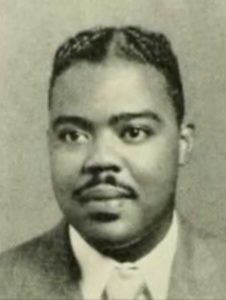“James Walker, Jr. was born on February 25th, 1924 in Ahoskie, North Carolina to Ethel and James Walker. He was the oldest of eight children, and spent most of his childhood in Statesville, NC. Walker attended North Carolina Central University from 1942 to 1943. In 1944 he enlisted in the army, and proudly served on both fronts of World War II. He was honorably discharged from the army in 1947, after which he re-enrolled at North Carolina Central, graduating in 1948. After graduating, he applied to the University of North Carolina Law School, where he was rejected on the basis of race.
Walker chose to attend North Carolina College at Durham Law School, however, he eventually withdrew due to unequal treatment. After withdrawing from the North Carolina College at Durham he transferred to Boston Law School. While attending Boston Law School, Walker was one of five plaintiffs in a case brought against UNC Law School for racial discrimination. They won their case, and in 1952 Walker became one of the first five African-American men to attend UNC Law School (and the first five to attend any UNC Chapel Hill school). While attending UNC, Walker was integral in the desegregation of campus, and the push for civil rights on campus. He led a student protest calling for the desegregation of UNC’s football stadium, and fought to integrate other aspects of campus life at UNC. He also became the first African-American member of the Dialectic and Philanthropic Societies.

James Walker Jr’s photo in the UNC Law School Yearbook, 1952
In 1952, Walker graduated UNC, going on to become a prominent civil rights attorney in North Carolina. According to Walker’s family members, he rarely accepted money for his work. He chose instead to drive across the state, often using his car as an office. His many accomplishments include the spearheading of a massive voter registration campaign for African-American residents of Halifax County, and successfully arguing a voting rights case in front of the U.S. Supreme Court, as well as being an integral part of a second U.S. Supreme Court case dealing with school segregation. He was recognized by North Carolina’s NAACP, who gave him their Distinguished Service award. He was also honored by the National Lawyer’s Guild as Lawyer of the Year in 1978. Once retiring from law, Walker became a pastor, working at several different churches in North Carolina and Virginia.”
Taken from the Dialectic and Philanthropic Societies Foundation website, linked below
See our ongoing fundraiser to get Walker’s physical portrait done here.
Additional Information on James Walker, Jr.:
- “James R. Walker, Jr. & the Struggle for Voting Rights in North Carolina’s Black Belt,” by David Cecelski (2020).
- “James R. Walker, Jr. Portrait Fund,” by DiPhi Foundation (2019).
- The James Walker Jr. Recordings #05806, Southern Historical Collection, The Wilson Library, University of North Carolina at Chapel Hill.
- “New Names on the Landscape,” UNC Libraries, by Nicholas Graham (2020).
- “Picture This: James Walker, Remembered,” Alumni Review article (2020).

